HLSC111 The Person Health and Wellbeing
VerifiedAdded on 2022/12/29
|8
|2015
|61
AI Summary
This essay explores the Transtheoretical Model of Change and Motivational Interviewing in the context of health behavior change. It discusses the stages of change and provides insights on how to effectively support individuals in their journey towards behavior change. The essay also highlights the importance of practical, cognitive, and evaluation processes in promoting positive behavior and healthy living.
Contribute Materials
Your contribution can guide someone’s learning journey. Share your
documents today.
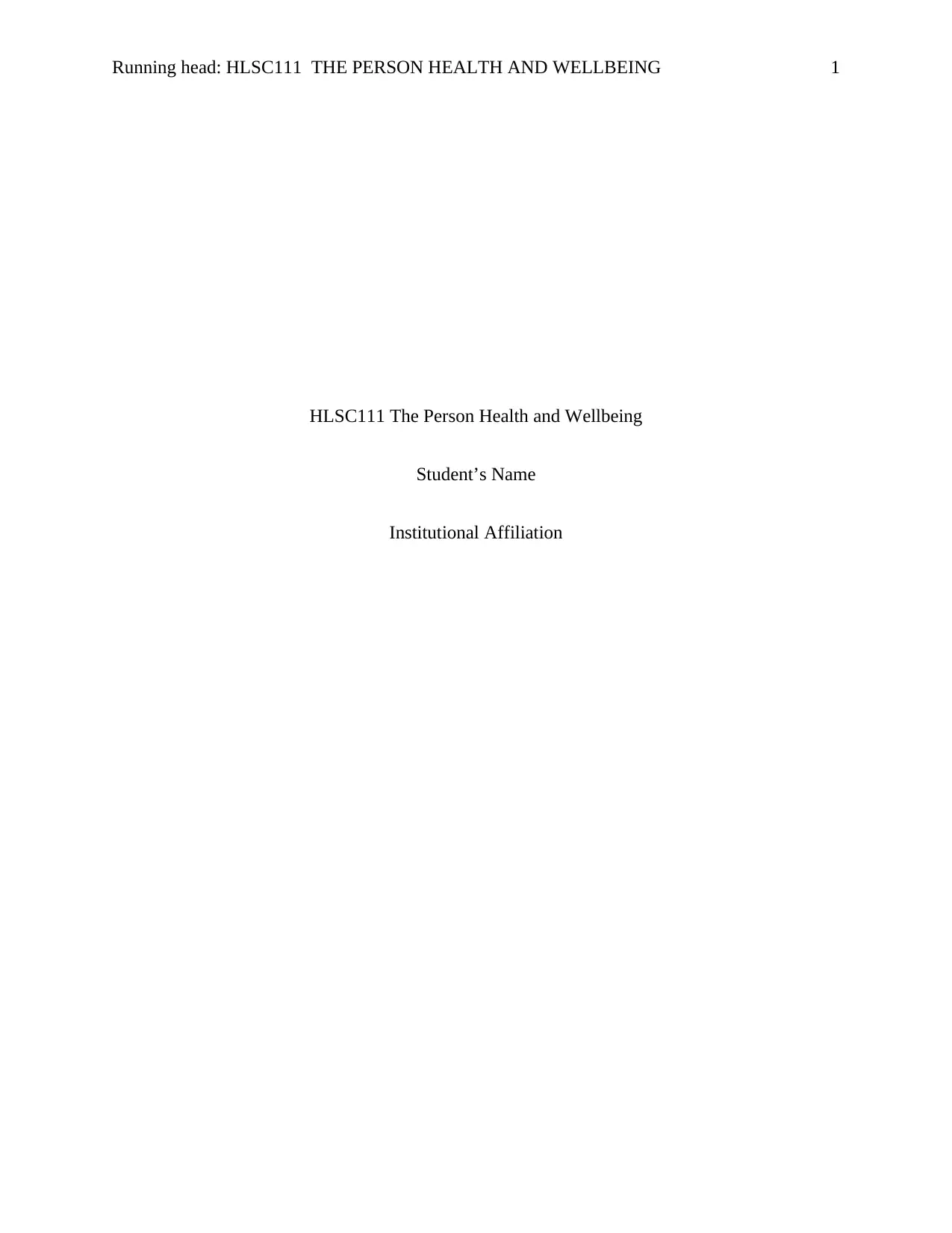
Running head: HLSC111 THE PERSON HEALTH AND WELLBEING 1
HLSC111 The Person Health and Wellbeing
Student’s Name
Institutional Affiliation
HLSC111 The Person Health and Wellbeing
Student’s Name
Institutional Affiliation
Secure Best Marks with AI Grader
Need help grading? Try our AI Grader for instant feedback on your assignments.
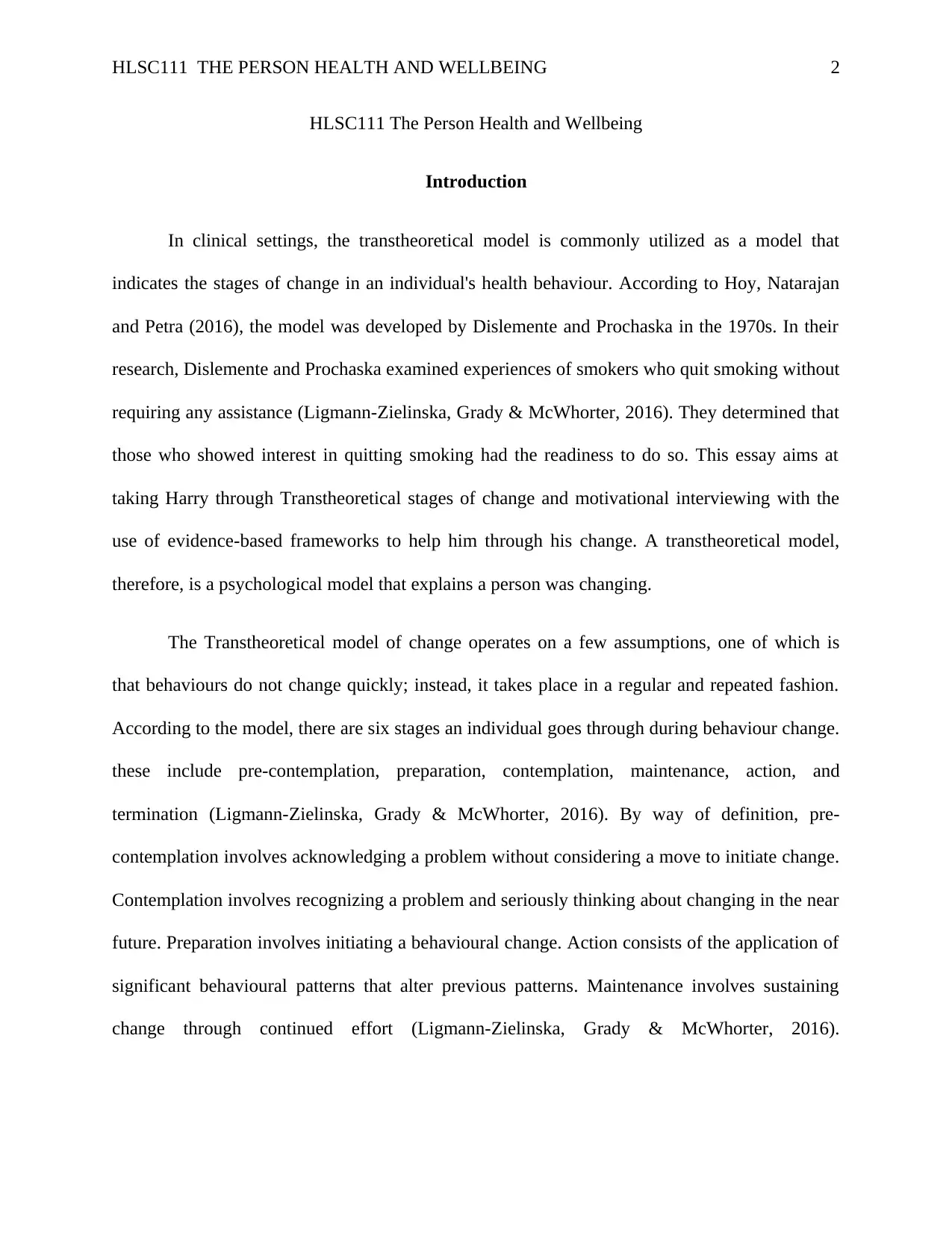
HLSC111 THE PERSON HEALTH AND WELLBEING 2
HLSC111 The Person Health and Wellbeing
Introduction
In clinical settings, the transtheoretical model is commonly utilized as a model that
indicates the stages of change in an individual's health behaviour. According to Hoy, Natarajan
and Petra (2016), the model was developed by Dislemente and Prochaska in the 1970s. In their
research, Dislemente and Prochaska examined experiences of smokers who quit smoking without
requiring any assistance (Ligmann-Zielinska, Grady & McWhorter, 2016). They determined that
those who showed interest in quitting smoking had the readiness to do so. This essay aims at
taking Harry through Transtheoretical stages of change and motivational interviewing with the
use of evidence-based frameworks to help him through his change. A transtheoretical model,
therefore, is a psychological model that explains a person was changing.
The Transtheoretical model of change operates on a few assumptions, one of which is
that behaviours do not change quickly; instead, it takes place in a regular and repeated fashion.
According to the model, there are six stages an individual goes through during behaviour change.
these include pre-contemplation, preparation, contemplation, maintenance, action, and
termination (Ligmann-Zielinska, Grady & McWhorter, 2016). By way of definition, pre-
contemplation involves acknowledging a problem without considering a move to initiate change.
Contemplation involves recognizing a problem and seriously thinking about changing in the near
future. Preparation involves initiating a behavioural change. Action consists of the application of
significant behavioural patterns that alter previous patterns. Maintenance involves sustaining
change through continued effort (Ligmann-Zielinska, Grady & McWhorter, 2016).
HLSC111 The Person Health and Wellbeing
Introduction
In clinical settings, the transtheoretical model is commonly utilized as a model that
indicates the stages of change in an individual's health behaviour. According to Hoy, Natarajan
and Petra (2016), the model was developed by Dislemente and Prochaska in the 1970s. In their
research, Dislemente and Prochaska examined experiences of smokers who quit smoking without
requiring any assistance (Ligmann-Zielinska, Grady & McWhorter, 2016). They determined that
those who showed interest in quitting smoking had the readiness to do so. This essay aims at
taking Harry through Transtheoretical stages of change and motivational interviewing with the
use of evidence-based frameworks to help him through his change. A transtheoretical model,
therefore, is a psychological model that explains a person was changing.
The Transtheoretical model of change operates on a few assumptions, one of which is
that behaviours do not change quickly; instead, it takes place in a regular and repeated fashion.
According to the model, there are six stages an individual goes through during behaviour change.
these include pre-contemplation, preparation, contemplation, maintenance, action, and
termination (Ligmann-Zielinska, Grady & McWhorter, 2016). By way of definition, pre-
contemplation involves acknowledging a problem without considering a move to initiate change.
Contemplation involves recognizing a problem and seriously thinking about changing in the near
future. Preparation involves initiating a behavioural change. Action consists of the application of
significant behavioural patterns that alter previous patterns. Maintenance involves sustaining
change through continued effort (Ligmann-Zielinska, Grady & McWhorter, 2016).
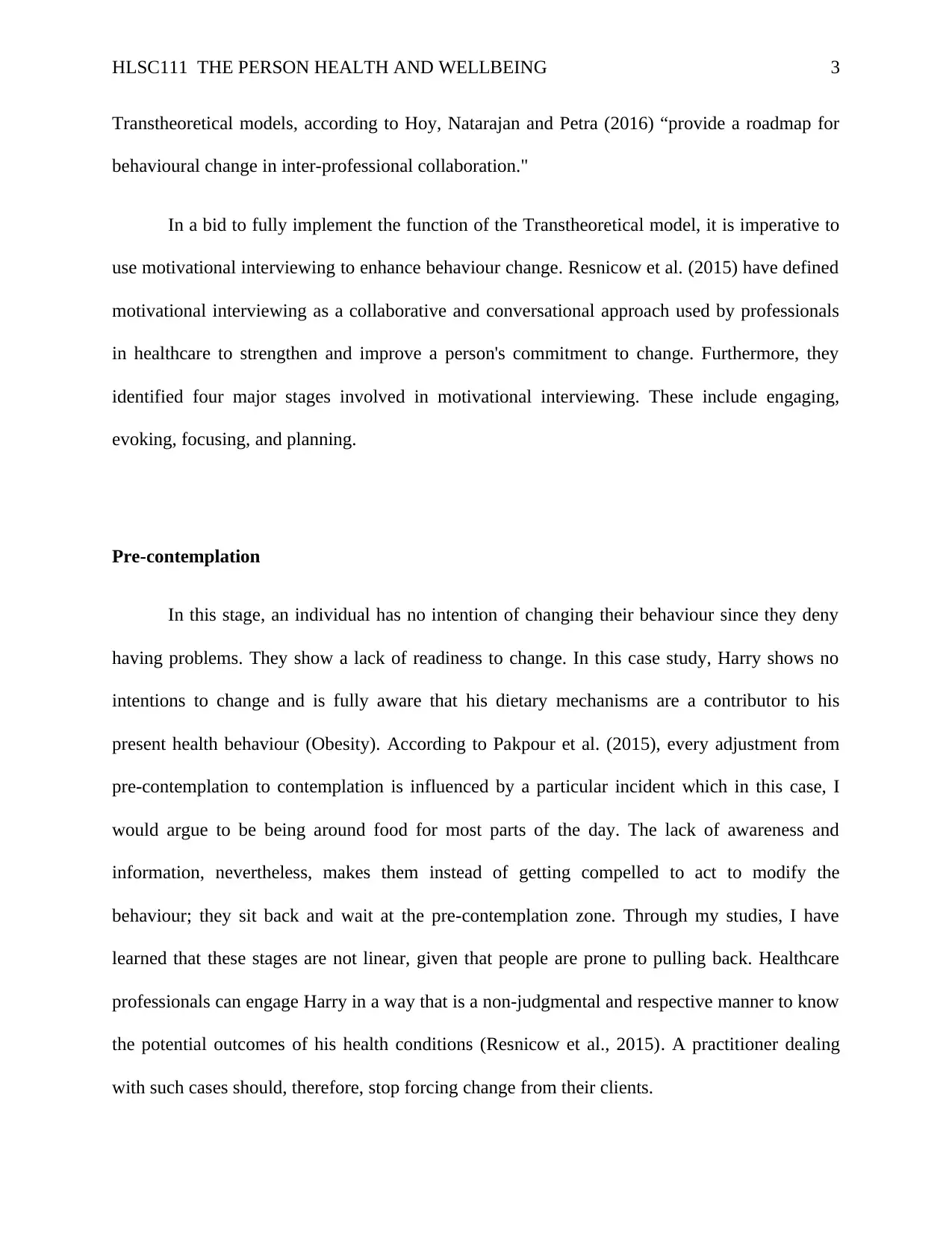
HLSC111 THE PERSON HEALTH AND WELLBEING 3
Transtheoretical models, according to Hoy, Natarajan and Petra (2016) “provide a roadmap for
behavioural change in inter-professional collaboration."
In a bid to fully implement the function of the Transtheoretical model, it is imperative to
use motivational interviewing to enhance behaviour change. Resnicow et al. (2015) have defined
motivational interviewing as a collaborative and conversational approach used by professionals
in healthcare to strengthen and improve a person's commitment to change. Furthermore, they
identified four major stages involved in motivational interviewing. These include engaging,
evoking, focusing, and planning.
Pre-contemplation
In this stage, an individual has no intention of changing their behaviour since they deny
having problems. They show a lack of readiness to change. In this case study, Harry shows no
intentions to change and is fully aware that his dietary mechanisms are a contributor to his
present health behaviour (Obesity). According to Pakpour et al. (2015), every adjustment from
pre-contemplation to contemplation is influenced by a particular incident which in this case, I
would argue to be being around food for most parts of the day. The lack of awareness and
information, nevertheless, makes them instead of getting compelled to act to modify the
behaviour; they sit back and wait at the pre-contemplation zone. Through my studies, I have
learned that these stages are not linear, given that people are prone to pulling back. Healthcare
professionals can engage Harry in a way that is a non-judgmental and respective manner to know
the potential outcomes of his health conditions (Resnicow et al., 2015). A practitioner dealing
with such cases should, therefore, stop forcing change from their clients.
Transtheoretical models, according to Hoy, Natarajan and Petra (2016) “provide a roadmap for
behavioural change in inter-professional collaboration."
In a bid to fully implement the function of the Transtheoretical model, it is imperative to
use motivational interviewing to enhance behaviour change. Resnicow et al. (2015) have defined
motivational interviewing as a collaborative and conversational approach used by professionals
in healthcare to strengthen and improve a person's commitment to change. Furthermore, they
identified four major stages involved in motivational interviewing. These include engaging,
evoking, focusing, and planning.
Pre-contemplation
In this stage, an individual has no intention of changing their behaviour since they deny
having problems. They show a lack of readiness to change. In this case study, Harry shows no
intentions to change and is fully aware that his dietary mechanisms are a contributor to his
present health behaviour (Obesity). According to Pakpour et al. (2015), every adjustment from
pre-contemplation to contemplation is influenced by a particular incident which in this case, I
would argue to be being around food for most parts of the day. The lack of awareness and
information, nevertheless, makes them instead of getting compelled to act to modify the
behaviour; they sit back and wait at the pre-contemplation zone. Through my studies, I have
learned that these stages are not linear, given that people are prone to pulling back. Healthcare
professionals can engage Harry in a way that is a non-judgmental and respective manner to know
the potential outcomes of his health conditions (Resnicow et al., 2015). A practitioner dealing
with such cases should, therefore, stop forcing change from their clients.
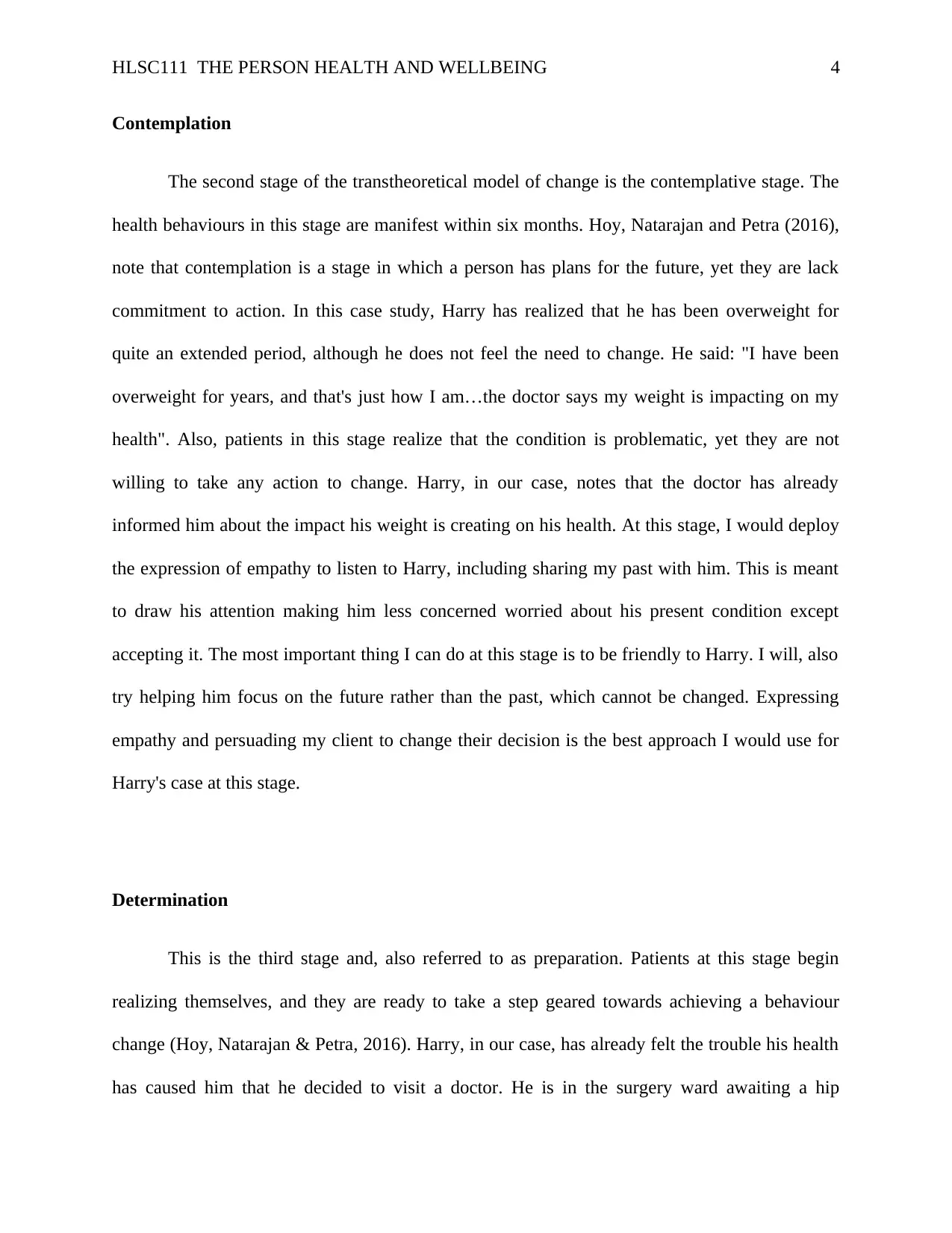
HLSC111 THE PERSON HEALTH AND WELLBEING 4
Contemplation
The second stage of the transtheoretical model of change is the contemplative stage. The
health behaviours in this stage are manifest within six months. Hoy, Natarajan and Petra (2016),
note that contemplation is a stage in which a person has plans for the future, yet they are lack
commitment to action. In this case study, Harry has realized that he has been overweight for
quite an extended period, although he does not feel the need to change. He said: "I have been
overweight for years, and that's just how I am…the doctor says my weight is impacting on my
health". Also, patients in this stage realize that the condition is problematic, yet they are not
willing to take any action to change. Harry, in our case, notes that the doctor has already
informed him about the impact his weight is creating on his health. At this stage, I would deploy
the expression of empathy to listen to Harry, including sharing my past with him. This is meant
to draw his attention making him less concerned worried about his present condition except
accepting it. The most important thing I can do at this stage is to be friendly to Harry. I will, also
try helping him focus on the future rather than the past, which cannot be changed. Expressing
empathy and persuading my client to change their decision is the best approach I would use for
Harry's case at this stage.
Determination
This is the third stage and, also referred to as preparation. Patients at this stage begin
realizing themselves, and they are ready to take a step geared towards achieving a behaviour
change (Hoy, Natarajan & Petra, 2016). Harry, in our case, has already felt the trouble his health
has caused him that he decided to visit a doctor. He is in the surgery ward awaiting a hip
Contemplation
The second stage of the transtheoretical model of change is the contemplative stage. The
health behaviours in this stage are manifest within six months. Hoy, Natarajan and Petra (2016),
note that contemplation is a stage in which a person has plans for the future, yet they are lack
commitment to action. In this case study, Harry has realized that he has been overweight for
quite an extended period, although he does not feel the need to change. He said: "I have been
overweight for years, and that's just how I am…the doctor says my weight is impacting on my
health". Also, patients in this stage realize that the condition is problematic, yet they are not
willing to take any action to change. Harry, in our case, notes that the doctor has already
informed him about the impact his weight is creating on his health. At this stage, I would deploy
the expression of empathy to listen to Harry, including sharing my past with him. This is meant
to draw his attention making him less concerned worried about his present condition except
accepting it. The most important thing I can do at this stage is to be friendly to Harry. I will, also
try helping him focus on the future rather than the past, which cannot be changed. Expressing
empathy and persuading my client to change their decision is the best approach I would use for
Harry's case at this stage.
Determination
This is the third stage and, also referred to as preparation. Patients at this stage begin
realizing themselves, and they are ready to take a step geared towards achieving a behaviour
change (Hoy, Natarajan & Petra, 2016). Harry, in our case, has already felt the trouble his health
has caused him that he decided to visit a doctor. He is in the surgery ward awaiting a hip
Secure Best Marks with AI Grader
Need help grading? Try our AI Grader for instant feedback on your assignments.
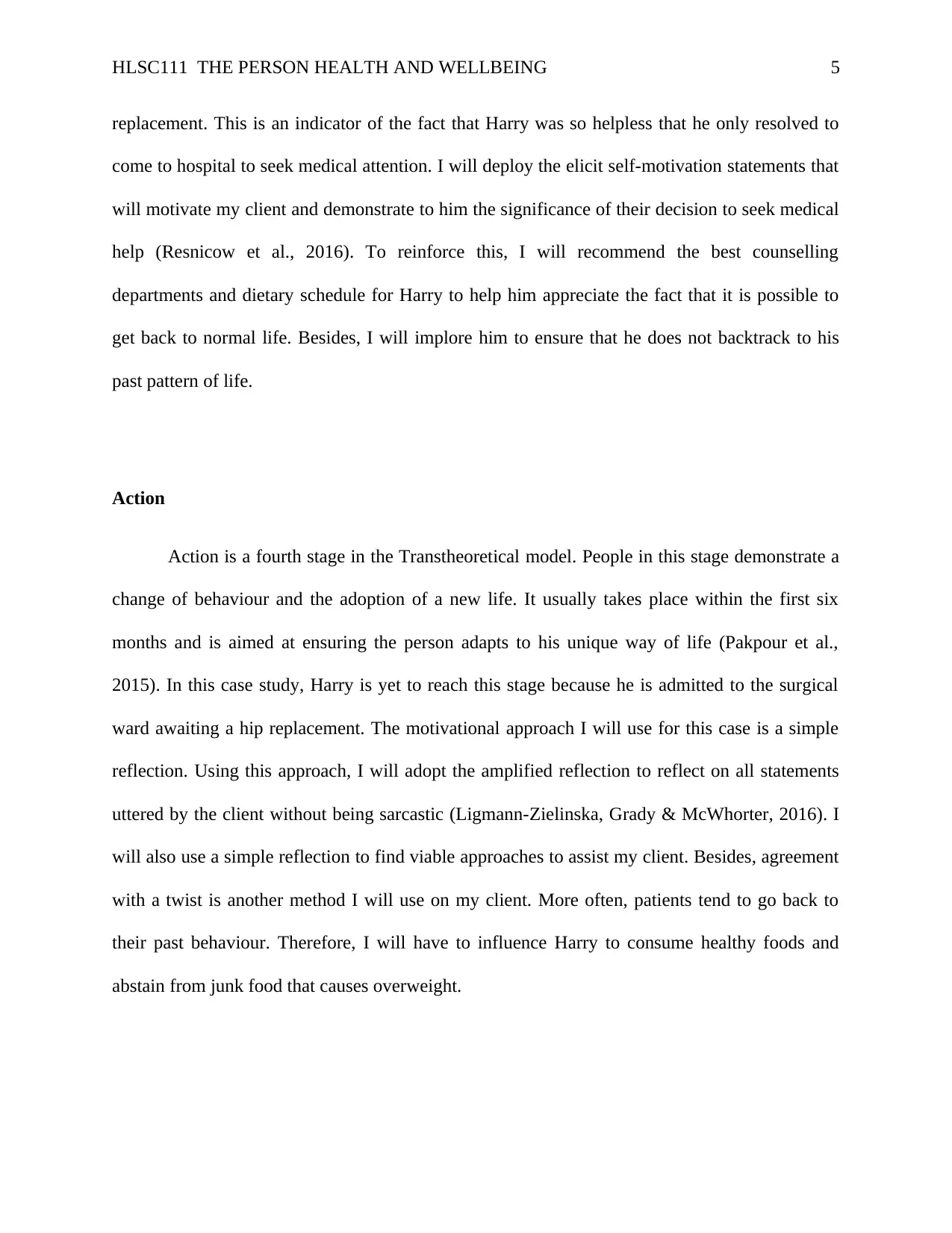
HLSC111 THE PERSON HEALTH AND WELLBEING 5
replacement. This is an indicator of the fact that Harry was so helpless that he only resolved to
come to hospital to seek medical attention. I will deploy the elicit self-motivation statements that
will motivate my client and demonstrate to him the significance of their decision to seek medical
help (Resnicow et al., 2016). To reinforce this, I will recommend the best counselling
departments and dietary schedule for Harry to help him appreciate the fact that it is possible to
get back to normal life. Besides, I will implore him to ensure that he does not backtrack to his
past pattern of life.
Action
Action is a fourth stage in the Transtheoretical model. People in this stage demonstrate a
change of behaviour and the adoption of a new life. It usually takes place within the first six
months and is aimed at ensuring the person adapts to his unique way of life (Pakpour et al.,
2015). In this case study, Harry is yet to reach this stage because he is admitted to the surgical
ward awaiting a hip replacement. The motivational approach I will use for this case is a simple
reflection. Using this approach, I will adopt the amplified reflection to reflect on all statements
uttered by the client without being sarcastic (Ligmann-Zielinska, Grady & McWhorter, 2016). I
will also use a simple reflection to find viable approaches to assist my client. Besides, agreement
with a twist is another method I will use on my client. More often, patients tend to go back to
their past behaviour. Therefore, I will have to influence Harry to consume healthy foods and
abstain from junk food that causes overweight.
replacement. This is an indicator of the fact that Harry was so helpless that he only resolved to
come to hospital to seek medical attention. I will deploy the elicit self-motivation statements that
will motivate my client and demonstrate to him the significance of their decision to seek medical
help (Resnicow et al., 2016). To reinforce this, I will recommend the best counselling
departments and dietary schedule for Harry to help him appreciate the fact that it is possible to
get back to normal life. Besides, I will implore him to ensure that he does not backtrack to his
past pattern of life.
Action
Action is a fourth stage in the Transtheoretical model. People in this stage demonstrate a
change of behaviour and the adoption of a new life. It usually takes place within the first six
months and is aimed at ensuring the person adapts to his unique way of life (Pakpour et al.,
2015). In this case study, Harry is yet to reach this stage because he is admitted to the surgical
ward awaiting a hip replacement. The motivational approach I will use for this case is a simple
reflection. Using this approach, I will adopt the amplified reflection to reflect on all statements
uttered by the client without being sarcastic (Ligmann-Zielinska, Grady & McWhorter, 2016). I
will also use a simple reflection to find viable approaches to assist my client. Besides, agreement
with a twist is another method I will use on my client. More often, patients tend to go back to
their past behaviour. Therefore, I will have to influence Harry to consume healthy foods and
abstain from junk food that causes overweight.
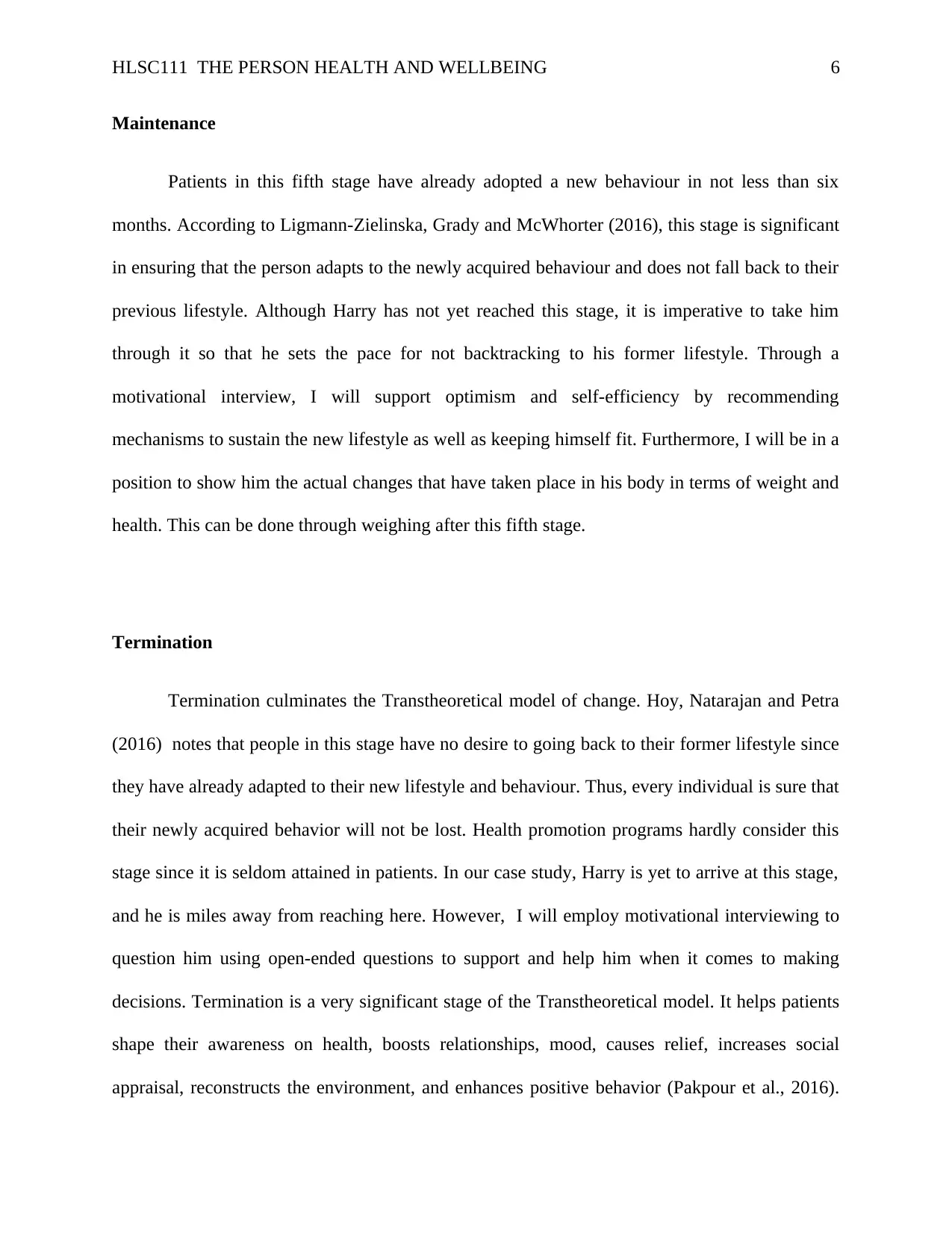
HLSC111 THE PERSON HEALTH AND WELLBEING 6
Maintenance
Patients in this fifth stage have already adopted a new behaviour in not less than six
months. According to Ligmann-Zielinska, Grady and McWhorter (2016), this stage is significant
in ensuring that the person adapts to the newly acquired behaviour and does not fall back to their
previous lifestyle. Although Harry has not yet reached this stage, it is imperative to take him
through it so that he sets the pace for not backtracking to his former lifestyle. Through a
motivational interview, I will support optimism and self-efficiency by recommending
mechanisms to sustain the new lifestyle as well as keeping himself fit. Furthermore, I will be in a
position to show him the actual changes that have taken place in his body in terms of weight and
health. This can be done through weighing after this fifth stage.
Termination
Termination culminates the Transtheoretical model of change. Hoy, Natarajan and Petra
(2016) notes that people in this stage have no desire to going back to their former lifestyle since
they have already adapted to their new lifestyle and behaviour. Thus, every individual is sure that
their newly acquired behavior will not be lost. Health promotion programs hardly consider this
stage since it is seldom attained in patients. In our case study, Harry is yet to arrive at this stage,
and he is miles away from reaching here. However, I will employ motivational interviewing to
question him using open-ended questions to support and help him when it comes to making
decisions. Termination is a very significant stage of the Transtheoretical model. It helps patients
shape their awareness on health, boosts relationships, mood, causes relief, increases social
appraisal, reconstructs the environment, and enhances positive behavior (Pakpour et al., 2016).
Maintenance
Patients in this fifth stage have already adopted a new behaviour in not less than six
months. According to Ligmann-Zielinska, Grady and McWhorter (2016), this stage is significant
in ensuring that the person adapts to the newly acquired behaviour and does not fall back to their
previous lifestyle. Although Harry has not yet reached this stage, it is imperative to take him
through it so that he sets the pace for not backtracking to his former lifestyle. Through a
motivational interview, I will support optimism and self-efficiency by recommending
mechanisms to sustain the new lifestyle as well as keeping himself fit. Furthermore, I will be in a
position to show him the actual changes that have taken place in his body in terms of weight and
health. This can be done through weighing after this fifth stage.
Termination
Termination culminates the Transtheoretical model of change. Hoy, Natarajan and Petra
(2016) notes that people in this stage have no desire to going back to their former lifestyle since
they have already adapted to their new lifestyle and behaviour. Thus, every individual is sure that
their newly acquired behavior will not be lost. Health promotion programs hardly consider this
stage since it is seldom attained in patients. In our case study, Harry is yet to arrive at this stage,
and he is miles away from reaching here. However, I will employ motivational interviewing to
question him using open-ended questions to support and help him when it comes to making
decisions. Termination is a very significant stage of the Transtheoretical model. It helps patients
shape their awareness on health, boosts relationships, mood, causes relief, increases social
appraisal, reconstructs the environment, and enhances positive behavior (Pakpour et al., 2016).
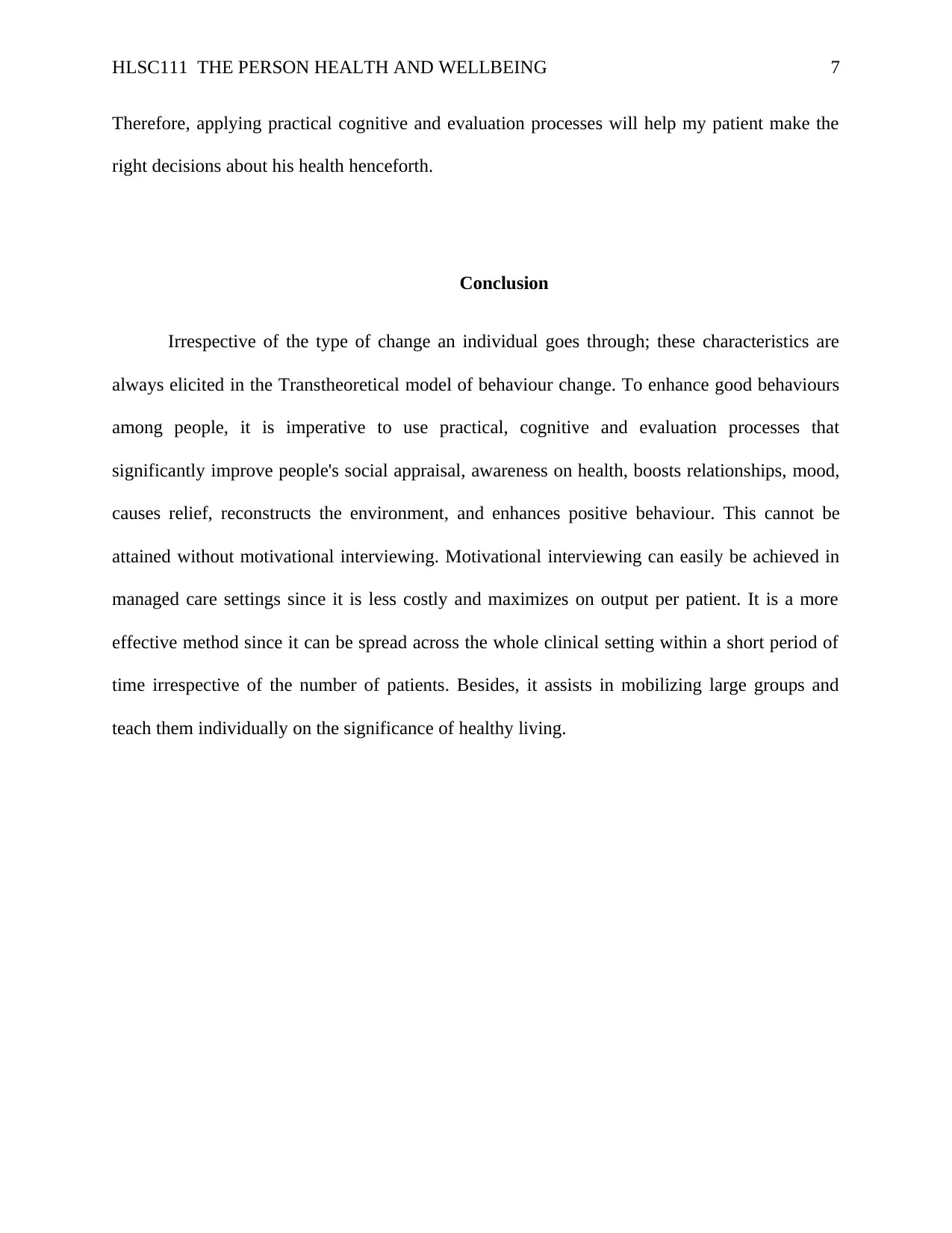
HLSC111 THE PERSON HEALTH AND WELLBEING 7
Therefore, applying practical cognitive and evaluation processes will help my patient make the
right decisions about his health henceforth.
Conclusion
Irrespective of the type of change an individual goes through; these characteristics are
always elicited in the Transtheoretical model of behaviour change. To enhance good behaviours
among people, it is imperative to use practical, cognitive and evaluation processes that
significantly improve people's social appraisal, awareness on health, boosts relationships, mood,
causes relief, reconstructs the environment, and enhances positive behaviour. This cannot be
attained without motivational interviewing. Motivational interviewing can easily be achieved in
managed care settings since it is less costly and maximizes on output per patient. It is a more
effective method since it can be spread across the whole clinical setting within a short period of
time irrespective of the number of patients. Besides, it assists in mobilizing large groups and
teach them individually on the significance of healthy living.
Therefore, applying practical cognitive and evaluation processes will help my patient make the
right decisions about his health henceforth.
Conclusion
Irrespective of the type of change an individual goes through; these characteristics are
always elicited in the Transtheoretical model of behaviour change. To enhance good behaviours
among people, it is imperative to use practical, cognitive and evaluation processes that
significantly improve people's social appraisal, awareness on health, boosts relationships, mood,
causes relief, reconstructs the environment, and enhances positive behaviour. This cannot be
attained without motivational interviewing. Motivational interviewing can easily be achieved in
managed care settings since it is less costly and maximizes on output per patient. It is a more
effective method since it can be spread across the whole clinical setting within a short period of
time irrespective of the number of patients. Besides, it assists in mobilizing large groups and
teach them individually on the significance of healthy living.
Paraphrase This Document
Need a fresh take? Get an instant paraphrase of this document with our AI Paraphraser
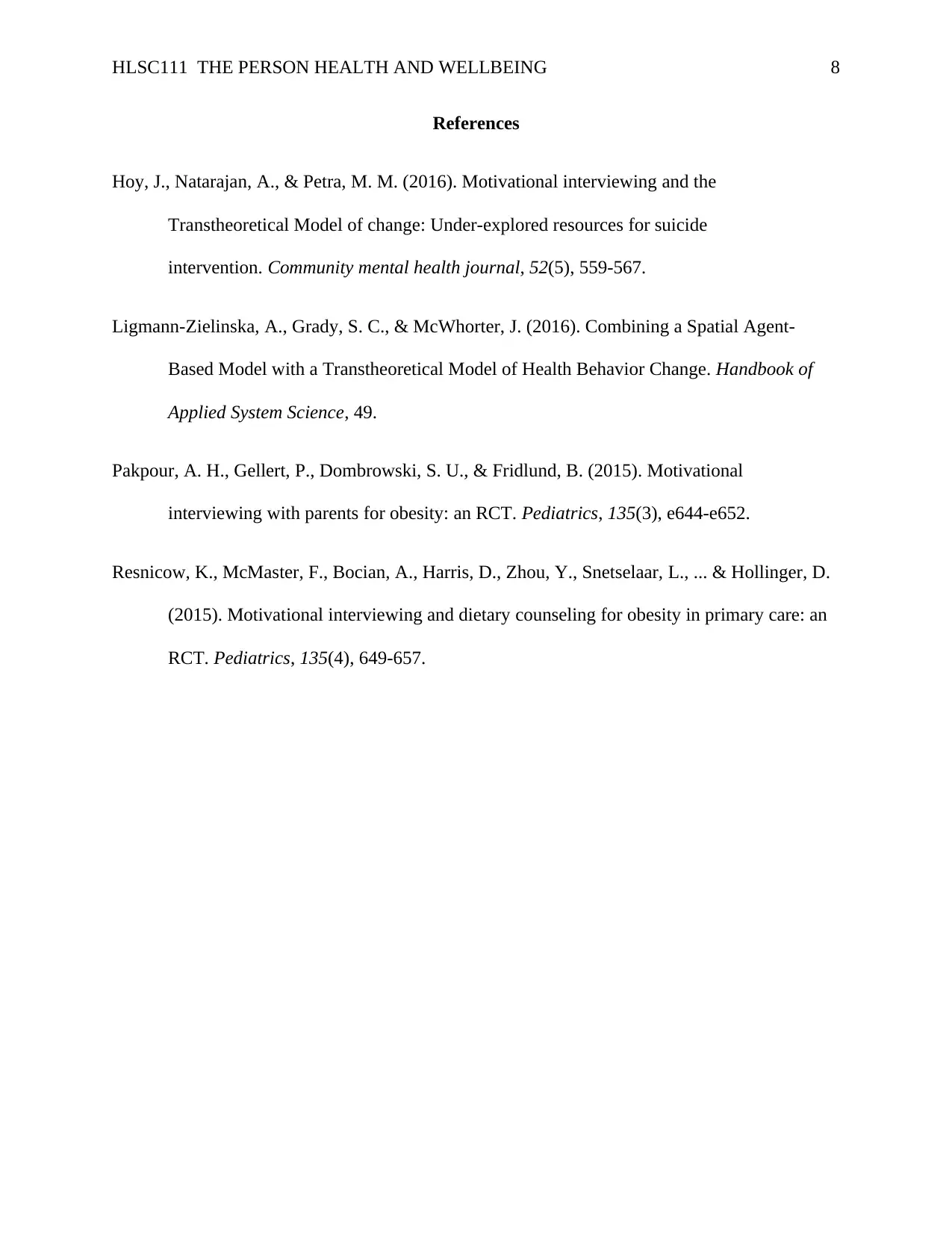
HLSC111 THE PERSON HEALTH AND WELLBEING 8
References
Hoy, J., Natarajan, A., & Petra, M. M. (2016). Motivational interviewing and the
Transtheoretical Model of change: Under-explored resources for suicide
intervention. Community mental health journal, 52(5), 559-567.
Ligmann-Zielinska, A., Grady, S. C., & McWhorter, J. (2016). Combining a Spatial Agent-
Based Model with a Transtheoretical Model of Health Behavior Change. Handbook of
Applied System Science, 49.
Pakpour, A. H., Gellert, P., Dombrowski, S. U., & Fridlund, B. (2015). Motivational
interviewing with parents for obesity: an RCT. Pediatrics, 135(3), e644-e652.
Resnicow, K., McMaster, F., Bocian, A., Harris, D., Zhou, Y., Snetselaar, L., ... & Hollinger, D.
(2015). Motivational interviewing and dietary counseling for obesity in primary care: an
RCT. Pediatrics, 135(4), 649-657.
References
Hoy, J., Natarajan, A., & Petra, M. M. (2016). Motivational interviewing and the
Transtheoretical Model of change: Under-explored resources for suicide
intervention. Community mental health journal, 52(5), 559-567.
Ligmann-Zielinska, A., Grady, S. C., & McWhorter, J. (2016). Combining a Spatial Agent-
Based Model with a Transtheoretical Model of Health Behavior Change. Handbook of
Applied System Science, 49.
Pakpour, A. H., Gellert, P., Dombrowski, S. U., & Fridlund, B. (2015). Motivational
interviewing with parents for obesity: an RCT. Pediatrics, 135(3), e644-e652.
Resnicow, K., McMaster, F., Bocian, A., Harris, D., Zhou, Y., Snetselaar, L., ... & Hollinger, D.
(2015). Motivational interviewing and dietary counseling for obesity in primary care: an
RCT. Pediatrics, 135(4), 649-657.
1 out of 8
Related Documents
Your All-in-One AI-Powered Toolkit for Academic Success.
+13062052269
info@desklib.com
Available 24*7 on WhatsApp / Email
![[object Object]](/_next/static/media/star-bottom.7253800d.svg)
Unlock your academic potential
© 2024 | Zucol Services PVT LTD | All rights reserved.





